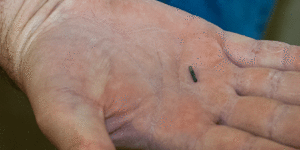Paint racehorse identification to use microchipping in 2024 & beyond
APHA and other major racing organizations are evolving to the use of microchipping to positively identify racehorses, beginning in 2024. This will eventually replace lip tattoos for Paint racehorses by January 1, 2025.
This evolution is consistent with use of microchips by other racing organizations, including the American Quarter Horse Association. About the size of a grain of rice, the microchip contains a 15-digit numerical code that can never be altered; it’s unique to that horse and thereby allows for positive identification of the animal. An APHA-approved identifier will scan and log the microchip information as part of the verification process.
 APHA is working with AQHA to develop an application for identifiers via the QHChip platform.
APHA is working with AQHA to develop an application for identifiers via the QHChip platform.
Two-Step Evolution
- In 2024, racehorses can use either microchip or lip-tattoo verification.
- Beginning January 1, 2025, only microchips will be used for racehorse identification verification.
Get Started
- Get your racehorse microchipped. This can be done by your veterinarian. Place the 15-digit IOS-compliant microchip stamp on the horse’s APHA registration certificate.
- Contact an APHA-approved identifier. The identifier will verify the microchip number matches the horse on the registration certificate and confirm the racehorse has been parentage verified.
- If verification is successful, pay the $119 racehorse identification fee directly to the identifier. The identifier will stamp the horse’s registration certificate to confirm verification has been completed. The identifier is responsible for sending the microchip number, horse detail and payment to APHA.
- If the microchip verification is unsuccessful, contact Director of Racing Carly Peercy.
Microchip FAQ
Why do we have to use a microchip?
Microchipping provides a means of permanent and unique means to positively identify a horse. Lip tattoos can fade or become hard to read, leading to problems with positively identifying the horse. Microchips are a humane and effective way to ensure the correct horse is participating in a race. It also aligns APHA with other major racing organizations, including the Jockey Club and AQHA.
Your racehorse’s microchip details, like lip tattoo details, must be positively verified and reported to the parent organization and recorded on the horse’s registration certificate prior to racing. The track identifier will check participating horses for a microchip or lip tattoo prior to racing.
What’s the cost involved in microchipping?
The cost is $119 to verify a Paint racehorse’s identity by tattoo or microchip.
What if my horse is already microchipped?
To be eligible to race a horse that’s already been microchipped, the horse must be positively identified by an APHA-approved identifier. The horse’s registration papers must be stamped to indicate the verification and microchip data must be logged with the association. If your horse is registered with both APHA and AQHA, make sure to report the microchip information to the second organization after completing the process with the horse’s primary organization. A recording fee might apply; contact cpeercy@apha.com for details.
What if my horse is already lip tattooed?
Horses who were lip tattooed and positively identified via tattoo before January 1, 2025, will be allowed to continue using their tattoo for identification purposes.
[Reprinting all or part of this news release is permitted, so long as credit is given to the Paint Horse Journal and a link provided back to apha.com.]
About APHA
The American Paint Horse Association is the world’s second-largest international equine breed association. Since it was founded in 1962, APHA has registered more than a million horses in 59 nations and territories. APHA promotes, preserves and provides meaningful experiences with Paint Horses. Learn more at apha.com.


